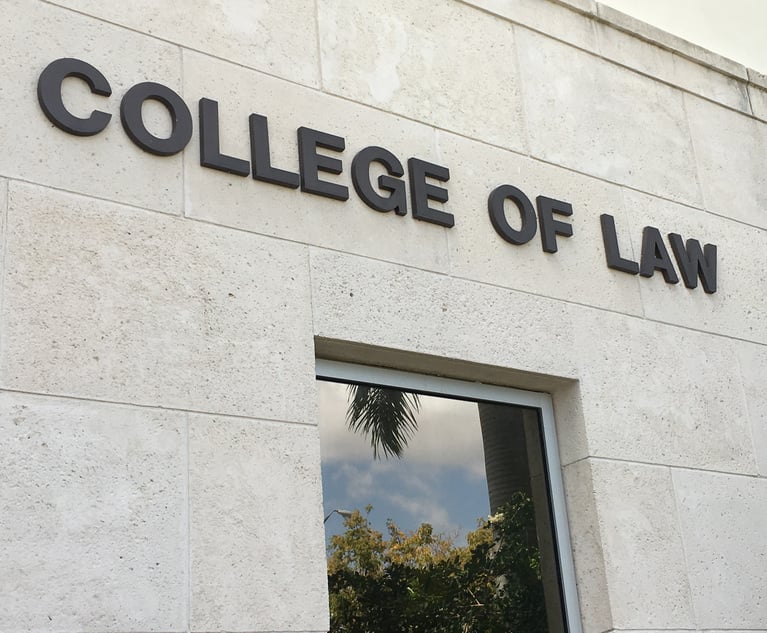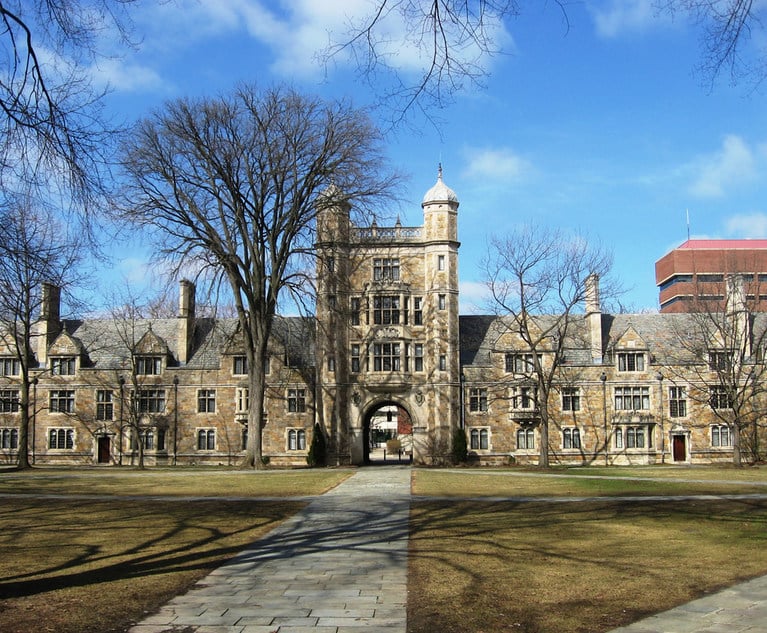Colleges Fear COVID-19 Spread, Class Actions Over Tuition When Welcoming Back Students
"I know it is difficult to say, 'Because I was on campus I got COVID-19,' but that is not going to stop someone from making the argument," said Dannelle Whiteside, general counsel and soon-to-be interim president at Austin Peay State University in Tennessee.
July 10, 2020 at 05:02 PM
5 minute read
The original version of this story was published on Corporate Counsel
 Students walk on the Quad lawn of University of Illinois college campus in Urbana Champaign image. Photo: Leigh Trail/Shutterstock.com
Students walk on the Quad lawn of University of Illinois college campus in Urbana Champaign image. Photo: Leigh Trail/Shutterstock.com
Colleges and universities across the country are beginning to figure out what the fall semester for students will look like. In-house counsel at the schools that have chosen to bring students back to campus full-time need to worry about furthering the spread of the new coronavirus and class action litigation over refunds for tuition, housing and service fees.
Making sure proper cleaning techniques are applied and fixing codes of conduct and housing contract language may be the best way to mitigate the risk of a lawsuit, attorneys who work in higher education told Corporate Counsel.
Dannelle Whiteside, general counsel and soon-to-be interim president of Austin Peay State University in Clarksville, Tennessee, said the administration at APSU has been focused on ensuring the necessary precautions are put in place to mitigate students' and employees' risk of exposure for the upcoming fall semester.
"I know it is difficult to say, 'Because I was on campus I got COVID-19,' but that is not going to stop someone from making the argument," Whiteside said.
To avoid litigation related to the spread of COVID-19, in-house counsel should start by advising their schools to follow the local and Centers for Disease Control and Prevention guidelines.
"There is a question about what kind of documentation should we have? Do we want people to sign a waiver with the assumption of risk type of language?" James Keller, partner and chair of the higher education practice at Saul Ewing Arnstein & Lehr in Philadelphia, said.
However, even getting students to wear masks while on campus may prove to be difficult, Keller said.
"You could build that into the codes of conduct and make it a condition of being a student," Keller said.
There are also issues of what to do with students with disabilities who cannot wear masks.
Class action lawsuits
If students do come back to campus and are suddenly asked to go home, colleges risk becoming a defendant in a class action lawsuit over tuition reimbursement. According to a recent survey from Carlton Fields, approximately 25% of all COVID-19-related class action lawsuits were filed against educational institutions seeks reimbursement of tuition.
Monica Khetarpal, principal at Jackson Lewis in Chicago and co-leader of the firm's higher education industry group, said lawsuits over housing and tuition reimbursement are inevitable.
"Schools have been making adjustments to housing contracts and to admissions agreements," Khetarpal said. "They are inserting clauses that say if the university is forced to go to online learning and if the dorms have to be vacated students will not be entitled a refund."
It is too early to tell how courts will rule on these kinds of lawsuits, Ed Cramp, a partner at Duane Morris in San Diego said. From his perspective, how education is delivered to a student is not something guaranteed by the university. However, the suits asking for a refund of fees for services not used could be problematic.
"The issue for the institutions is that many of them just don't have the money. It is not a matter of, 'Let me just write you a check,'" Cramp said.
APSU has not yet been served with a lawsuit over housing, tuition or reimbursement of fees. When the university went to an online model in the spring, Whiteside said students were encouraged to find off-campus housing but could remain in the dorms. Those students who left were given a prorated refund.
"That is a financial risk to us as well because we still have to pay debt service on those dormitories," Whiteside said.
Whiteside said the APSU would likely keep the dormitories open to students during the second wave of COVID-19 even if all classes are put online to ensure students have secure housing. The tuition at APSU has not been raised this year, Whiteside said. She said the decision came from a recognition that many people are out of work because of COVID-19 and that it would not be fair to raise tuition during a time of uncertainty, rather than a fear of a class action lawsuit.
Arbitration
State and nonprofit universities may begin contemplating the use of arbitration agreements with their students to prevent a series of class action lawsuits.
"I think they're really helpful to both sides," Cramp said. "They can be done with lawyers or without lawyers. It allows for a quick resolution of things. It also allows the institution to prohibit class actions."
Forced arbitration may be a hard sell for academia.
"Higher education is very different than corporate America where arbitration clauses are routinely used," Khetarpal said. "They might not be as readily embraced in this environment."
An everlasting arbitration agreement between the students and university may not be the best idea. Khetarpal said it may be better to create a COVID-19-specific arbitration agreement.
"I wouldn't expect them to be as widely applied as they are in corporate America," Khetarpal said.
This content has been archived. It is available through our partners, LexisNexis® and Bloomberg Law.
To view this content, please continue to their sites.
Not a Lexis Subscriber?
Subscribe Now
Not a Bloomberg Law Subscriber?
Subscribe Now
NOT FOR REPRINT
© 2025 ALM Global, LLC, All Rights Reserved. Request academic re-use from www.copyright.com. All other uses, submit a request to [email protected]. For more information visit Asset & Logo Licensing.
You Might Like
View All
Florida Law Schools Are Seeing a Bump in Applications for 2025, After Recent Declines at Flagship Schools
3 minute read

Law School Applications are Up Across the Country. Law Deans Aren't Sure Why
6 minute read
Librarian's Termination Violated First Amendment Protections, Lawsuit Claims
3 minute readLaw Firms Mentioned
Trending Stories
- 1'Translate Across Disciplines': Paul Hastings’ New Tech Transactions Leader
- 2Milbank’s Revenue and Profits Surge Following Demand Increases Across the Board
- 3Fourth Quarter Growth in Demand and Worked Rates Coincided with Countercyclical Dip, New Report Indicates
- 4Public Notices/Calendars
- 5Monday Newspaper
Who Got The Work
J. Brugh Lower of Gibbons has entered an appearance for industrial equipment supplier Devco Corporation in a pending trademark infringement lawsuit. The suit, accusing the defendant of selling knock-off Graco products, was filed Dec. 18 in New Jersey District Court by Rivkin Radler on behalf of Graco Inc. and Graco Minnesota. The case, assigned to U.S. District Judge Zahid N. Quraishi, is 3:24-cv-11294, Graco Inc. et al v. Devco Corporation.
Who Got The Work
Rebecca Maller-Stein and Kent A. Yalowitz of Arnold & Porter Kaye Scholer have entered their appearances for Hanaco Venture Capital and its executives, Lior Prosor and David Frankel, in a pending securities lawsuit. The action, filed on Dec. 24 in New York Southern District Court by Zell, Aron & Co. on behalf of Goldeneye Advisors, accuses the defendants of negligently and fraudulently managing the plaintiff's $1 million investment. The case, assigned to U.S. District Judge Vernon S. Broderick, is 1:24-cv-09918, Goldeneye Advisors, LLC v. Hanaco Venture Capital, Ltd. et al.
Who Got The Work
Attorneys from A&O Shearman has stepped in as defense counsel for Toronto-Dominion Bank and other defendants in a pending securities class action. The suit, filed Dec. 11 in New York Southern District Court by Bleichmar Fonti & Auld, accuses the defendants of concealing the bank's 'pervasive' deficiencies in regards to its compliance with the Bank Secrecy Act and the quality of its anti-money laundering controls. The case, assigned to U.S. District Judge Arun Subramanian, is 1:24-cv-09445, Gonzalez v. The Toronto-Dominion Bank et al.
Who Got The Work
Crown Castle International, a Pennsylvania company providing shared communications infrastructure, has turned to Luke D. Wolf of Gordon Rees Scully Mansukhani to fend off a pending breach-of-contract lawsuit. The court action, filed Nov. 25 in Michigan Eastern District Court by Hooper Hathaway PC on behalf of The Town Residences LLC, accuses Crown Castle of failing to transfer approximately $30,000 in utility payments from T-Mobile in breach of a roof-top lease and assignment agreement. The case, assigned to U.S. District Judge Susan K. Declercq, is 2:24-cv-13131, The Town Residences LLC v. T-Mobile US, Inc. et al.
Who Got The Work
Wilfred P. Coronato and Daniel M. Schwartz of McCarter & English have stepped in as defense counsel to Electrolux Home Products Inc. in a pending product liability lawsuit. The court action, filed Nov. 26 in New York Eastern District Court by Poulos Lopiccolo PC and Nagel Rice LLP on behalf of David Stern, alleges that the defendant's refrigerators’ drawers and shelving repeatedly break and fall apart within months after purchase. The case, assigned to U.S. District Judge Joan M. Azrack, is 2:24-cv-08204, Stern v. Electrolux Home Products, Inc.
Featured Firms
Law Offices of Gary Martin Hays & Associates, P.C.
(470) 294-1674
Law Offices of Mark E. Salomone
(857) 444-6468
Smith & Hassler
(713) 739-1250








